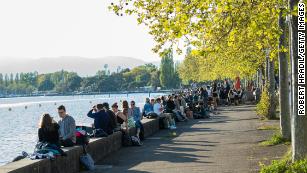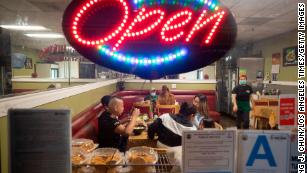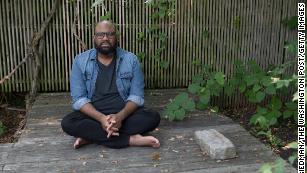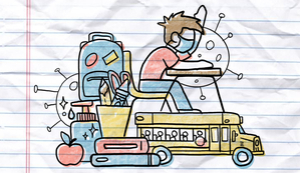(CNN) As the Labor Day holiday nears, many people are planning travel and get-togethers to see family and friends.
Unfortunately, this is occurring at the same time Covid-19 rates are climbing. The rates of new coronavirus infections are higher than they have been since January. Hospitalizations are also at their highest levels since January. In many parts of the United States, both infections and hospitalizations are higher than they were during Labor Day weekend in 2020.
How should people think about Covid-19 safety now, compared to last year? Is it safe to see family and friends? What if extended family members want to stay in a house together -- what are some steps they should take to reduce risk? And how does the start of school affect our risk?
To help navigate these questions, we spoke with CNN Medical Analyst Dr. Leana Wen. Wen is an emergency physician and visiting professor of health policy and management at the George Washington University Milken Institute School of Public Health. She's also author of a new book, "Lifelines: A Doctor's Journey in the Fight for Public Health.
CNN: How should people be thinking about their risk this Labor Day compared to last year's holiday?
Dr. Leana Wen: Things are very different this Labor Day compared to last year for one main reason. We have vaccines that are safe and protect very well against severe Covid-19 disease. People who are unvaccinated are 29 times more likely to be hospitalized for severe Covid-19 than people who are vaccinated, Los Angeles County health officials said in a report published by the US Centers for Disease Control and Prevention.
That said, the vaccines are not 100% effective. The higher the rate of infection in the community around you, the higher likelihood you will have of contracting a breakthrough case Covid-19. Chances are that you would get a mild infection even if you did get the virus, but some people will not want to get a breakthrough infection at all. Perhaps they are older, with chronic medical conditions, and even a mild infection could make them quite ill. Or maybe they live at home with unvaccinated children or immunocompromised people, and don't want to pass along the virus to their family members.
It makes sense that some people continue to be very cautious even after being vaccinated, and, for example, try to avoid indoor gatherings and always mask in indoor public places.
Unvaccinated people remain at high risk. That includes children under 12 who are too young to be vaccinated. They are probably at higher risk this Labor Day compared to last year, because of the more contagious Delta variant that's dominant in the United States, the high level of Covid-19 in many parts of the country, and the behavior of many people who have let down their guard. Unvaccinated people should take every precaution they did last year at this time, if not more.
CNN: Many families want to get together over Labor Day. What's the safest way to gather?
Wen: Outdoors remains the safest option for everyone, vaccinated or unvaccinated. If there are unvaccinated people from different households mixing -- for example, if there are multiple young children getting together -- they really should only be getting together outdoors. Outdoors, I am fine with people not wearing masks. The risk of transmission is much, much lower than indoors.
CNN: What if everyone is vaccinated? Can they get together indoors?
Wen: That depends on everyone's medical circumstances and tolerance of risk. You are much safer getting together indoors with people whom you know to be vaccinated. The risk is low, but it isn't zero. If you are immunocompromised, you might opt to see others outdoors only. Another option is for everyone to reduce their risk for three days prior to getting together, then get tested. By reducing risk, I mean not being with other groups indoors and masking when in public for three days prior to the gathering. That would further reduce risk.
CNN: If there are families with unvaccinated children, and everyone is staying in the same house, would it make it safer if everyone gets tested before seeing one another?
Wen: Yes. I'd still recommend at least three days of reducing risk, followed by a test. That's not eliminating risk altogether, but it reduces risk.
CNN: What if the kids have been in school, and then are going to see family? Or what if they are starting school just after the family get-together?
Wen: If kids have been in school, and the school is following strict guidelines in line with the CDC guidance, the risk of transmission within the school is low. I'm less concerned about what happens in school than what happens after school.
For the three days prior to testing and getting together, please refrain from indoor playdates and gatherings with others. Your child should still go to in-person school; just make sure that they are always masked indoors during school.
Starting school after the holiday means that other kids might have traveled or attended large gatherings. Once your child returns to school, it's even more important to abide by all precautions during school, at after-school extracurriculars and during social activities to reduce the chance of picking up the virus from other kids.
CNN: Is it safe to go to restaurants, the pool or the beach?
Wen: Anything outdoors is going to be safer than indoors. An outdoor restaurant where you can be spaced apart from others will be much safer than indoor dining, which is considered to be a high-risk setting. I would urge unvaccinated people to refrain from dining indoors at a restaurant or bar, where they could be surrounded by unmasked and unvaccinated people.
An outdoor pool and the beach are generally pretty safe settings. Coronavirus isn't transmitted through the water, and the only concern would be if there are so many people you can't keep your distance. Use common sense here. If the pool or beach is so crowded you can't easily move around and keep 6 feet of distancing, consider returning when it's less crowded. If there is a small section that's crowded, wear a mask while there, then take off the mask once you're about to spread out.
CNN: Any travel advice for the holiday?
Wen: The CDC has just recommended that unvaccinated people not travel over Labor Day. Vaccinated people too should reevaluate travel plans depending on community transmission rates, they said.
In general, I think it's sound advice for everyone to think through their plans and assess their risk. I also think that there are different levels of risk associated with travel and ways to reduce that risk further. That said, it's pretty late before the holidays to tell, for example, families with young, unvaccinated kids that they should be scrapping their plans. And while its best to be vaccinated before travel, there's not enough time to reach full vaccination status before Labor Day if you're starting this week.
If you're traveling by plane, train, bus or another form of transportation where you could be around unvaccinated people, I highly recommend that you wear a high-quality mask -- ideally an N95 or KN95 mask. Try not to take off your mask, including to eat or drink, unless you absolutely must. Also make sure you are very careful at your destination; too often, people worry about what happens in transit, only to let down their guard and go out to indoor restaurants and see friends and family without thinking through the risks of these activities.
Be particularly careful and know the risk for unvaccinated people, including children too young to be vaccinated.
"day" - Google News
September 02, 2021 at 04:19AM
https://ift.tt/38wJQrs
Things are very different this Labor Day compared to last year, CNN medical analyst says - CNN
"day" - Google News
https://ift.tt/3f7h3fo
https://ift.tt/2VYSiKW
Bagikan Berita Ini


















0 Response to "Things are very different this Labor Day compared to last year, CNN medical analyst says - CNN"
Post a Comment